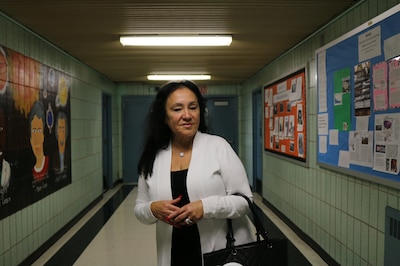The only thing standing between Fernando Garcia and a high school diploma was a single point on his global history Regents exam — or so he thought.
Garcia, a student with learning disabilities from the Bronx, met nearly all the exam requirements needed for graduation, but he fell one point shy of the passing score on global history. So he took the test again, and again, and again over the course of another school year.
Then, a former teacher told Garcia’s mother, Elizabeth Vargas, that her son’s score was actually high enough to qualify for an exception designed to help students with disabilities. But administrators repeatedly told her that wasn’t the case. It wasn’t until Vargas involved a lawyer that the exception was granted, and Garcia was able to graduate at age 21 last year.
“I don’t think that it should be that complicated,” Vargas said. “It’s so much time that I feel that was wasted.”
The confusion surrounding Garcia’s diploma grows out of the system that New York’s education leaders have been creating for years — carving out new ways for students to graduate that rely less on the passing the state’s traditional five Regents exams. The goal is to ensure students like Garcia don’t get left behind while keeping the state’s rigorous graduation standards. But it has also led to a system so complicated that the state had to create a six-part video series explaining the process for its website.
This hodgepodge of options has prompted a larger conversation about graduation among policymakers and advocates. At one end of the spectrum, some wonder if New York should follow the 37 other states that have already eliminated exit exams amid growing evidence that they don’t prepare students for life after high school. A different camp, though, thinks the state should double down on the basic graduation framework, sticking to exams and high standards as states like Massachusetts have done.

Each option holds promise but also drawbacks. Higher standards may motivate some to push themselves and give educators a benchmark — but other students will likely never reach those goals. Different pathways may ensure more students graduate, but marginalized students may be pushed into less challenging coursework. Leaving the system the way it is, however, makes it confusing and disjointed.
If the debate gets any farther in New York, it will likely prove to be an emotional one in a state where the term “Regents exam” has long been synonymous with wearing a cap and gown.
“We’re at the starting line of saying, what do students need to know and how do we know what they know?” said Board of Regents Chancellor Betty Rosa recently. “We’re exploring all of our options.”
The history of exit exams in New York
To understand New York’s graduation requirements in 2018, it is important to look back at 1995, when state officials began a march toward rigorous graduation standards.
In the early ‘90s, there were two tracks for high school students. College-bound students took the Regents exams, which were first authorized in 1876, while all other students took the much less rigorous Regents Competency Tests.
An astounding number of graduates — about 80 percent in New York City — were being steered into less challenging courses. For those students, there was little motivation and an extremely elementary review of material, said Peter Goodman, who was a teacher in New York City in the 90s.
“I used to put 40 kids in the [Regents Competency] classes because I knew only 20 of them would show up,” Goodman said. “They were on their way to dropping out of school and the school didn’t really care.”
Then the state’s Commissioner of Education, Richard Mills, had a solution: Promising “much higher levels of performance for everyone,” Mills proposed that New York adopt what would become some of the toughest graduation requirements in the country centered on passing a series of Regents exams. Initially, the plan was for students to be able to pass exams with a score of 55 and then later raise that score to 65.
“We ought not to have two levels of education with two standards,” Mills declared during a news conference at the time.
When Mills, who died in 2017, announced his plan, it was met with an outpouring of support across the education sector. Bob Lowry, deputy director of the New York State Council of School Superintendents who worked at the state teachers union office during the 90s, remembers “a lot of positive energy” surrounding the concept among lawmakers, policymakers, and union members. He recalls a fellow staffer at NYSUT turning to him to say, “We finally put our conscience behind the proposition that every student can learn.”
But it soon sunk in that the requirements would inevitably lead to some students not graduating. Still, Mills defended the plan.
“Some critics still assert that some students should be awarded a diploma with fewer than five Regents exams, or even none,” Mills said in 2005. “That would return us to the two-tiered system the public rejected.”
Originally, the plan was for all students to pass exams with a score of 65 by 2001, but that requirement kept getting delayed. In 2012, state officials finally implemented Mills’ vision of requiring students to pass five Regents exams with a score of 65 or higher to graduate.
At the same time, the state was rolling out the Common Core standards, which spell out what skills and knowledge students need at each grade level. When the tests were aligned with the new standards, they became more difficult.
There was some reason for concern during the rollout of these changes. Graduation rates decreased by slightly less than one percentage point in New York City after students were required to pass all Regents with a 65. The first year New York phased in the more difficult Common Core algebra Regents exam, passing rates plummeted statewide, falling nearly 10 percentage points.
But as standards were raised, work was happening behind the scenes to prevent major drops in graduation rates among the state’s neediest populations — namely, the creation of new exemptions. For instance, a new option that allowed students with disabilities to use a higher score on certain Regents exams to compensate for a lower score on others enabled that group’s graduation rate to shoot up seven percentage points in New York City between 2012 and 2013. Overall, statewide graduation rates have increased by about 15 percentage points since 2005.

Still, parents — particularly those with children who had disabilities — did not feel their children had enough options to earn a diploma. They started a Facebook page, which has more than 5,000 members, and began packing into Regents meetings wearing T-shirts and uniting under the slogan “Diplomas for All.”
It wasn’t only activists rethinking testing. The years of discussion broke open a larger conversation among policymakers and advocates about how students should demonstrate their skills and knowledge before they graduate. And shifting dynamics at the Board of Regents, coupled with a growing testing boycott movement, created greater skepticism of traditional standardized tests.
Instead of backing away from the tests entirely, which officials feared would look as though they were lowering standards too much, officials came up with more exemptions and compromises. They allowed students to substitute work in the arts, career and technical education, or a skills certificate for a Regents exam; let more students appeal a failed score; and tried to establish a set number of questions students had to answer correctly on certain exams so that graduation rates would not change.
Students with disabilities can now graduate without passing any Regents exams, and State Commissioner MaryEllen Elia quietly suspended the state’s plans to require all students to pass exams at the “college-ready” level by 2020.
State officials have stood by the series of changes as a way to keep standards rigorous but provide different paths for students to show they have mastered the material.
“We’re not saying that they have to do less,” said Angelica Infante-Green, a deputy education commissioner, during the Regents’ monthly meeting late last year when they changed the rules for students with disabilities. “What we’re talking about is, if you have a disability that precludes you from actually passing the exam, or demonstrating what you know with the current exams, this is the mechanism to do it.”
It’s unclear how much each of these changes has affected the graduation rate, but state officials said 9,900 students used the option to swap out their final Regents exam for another assessment this past year and appeals tripled in New York City in 2016 after the state made it easier to appeal a failed score.
Some worry that making too many exceptions to the traditional graduation requirements could have serious consequences.
Without a meaningful way to tell students whether they are prepared for college, students will arrive without the skills they need, said David Steiner, the former New York state education commissioner. Already, far too many students end up dropping out of college saddled with debt, Steiner said.
“It sends you a false signal about readiness,” Steiner said. “This isn’t academic. It’s real. Things have consequences.”
[For a full timeline of events click here.]
A scrambled system that frustrates educators and students
By sticking to this particular set of tests and carving out exceptions, the state has created a system that is confusing to many students and educators.
The Algebra Regents exam is a perfect example. The state wanted to phase in the difficult Common Core algebra exam, but officials were also committed to keeping graduation rates stable.
To accomplish both, state officials adjusted the number of questions students answered correctly in order to achieve a passing score. For instance, if students had to answer fewer questions correctly on the more rigorous test, the same number of students could pass the test and eventually graduate.
But some teachers worry that this shifting has gone too far. Students only needed to earn 27 out of 86 points June 2017 Algebra exam in order to pass. That amounts to only about 30 percent of the total points. Students can slide by with only a basic understanding of eighth-grade math, said Bobson Wong, who teaches math at a high school in Queens.
“With the way the Regents exams are set up right now,” Wong said, “it’s hard to demand mastery.”

The state’s changing cut scores frustrated Jean McTavish, who was the longtime principal of a transfer school in Manhattan and is now retired. She says that when the state changes cut scores, the Regents exams become fairly meaningless.
“They’ve been playing around with cut scores on Regents exams for as long as I can remember because of the graduation rate,” McTavish said.
State officials say that is not a fair characterization of their work. It is standard to adjust the number of questions students must answer correctly based on the difficulty of the exam. For that reason, simply looking at the number of questions answered correctly does not explain the test’s toughness. Additionally, officials said teachers were involved in setting these bars to ensure they are at an appropriate level for students.
There is also a danger that students — particularly low-income students of color — will be pushed into the less rigorous paths.
Already, an analysis shows early signs that black and low-income students are more likely to use one of the less rigorous or career-focused diploma paths. (The analysis doesn’t tell us whether those students would have otherwise taken a more rigorous path or not graduated at all in the past.)
One of those options allows students to substitute a Regents exam for a basic test that examines readiness for entry-level work.
Plus, for students, teachers, and families in New York, the mishmash of rules and exceptions that the state has carved out to make earning a diploma more achievable has made it challenging to decipher pathways to graduation, said Ashley Grant, a supervising staff attorney at Advocates for Children.
Grant says she helps families through the process, but that the state should create a more coherent system — one that doesn’t require an attorney’s assistance to understand.
“It shouldn’t take six tip sheets and a full-time staff,” Grant said. “It’s a really, really cumbersome process.”
But state officials defend the middle ground as the best method for giving students many ways to demonstrate the skills and knowledge they’ve mastered while also keeping the state’s rigorous standards.
“The Board of Regents and the State Education Department have made it a priority to allow students to demonstrate their proficiency to graduate in many ways,” said state education department spokeswoman Emily DeSantis. “This is not about changing our graduation standards. It’s about providing different avenues – equally rigorous – for kids to demonstrate they are ready to graduate with a meaningful diploma.”
In order to avoid confusion for educators or families, state officials also said they have posted a significant amount of information about their graduation requirements on their website. Additionally, they have put on presentations across the state, have tools for school counselors to help determine whether students are making process toward a diploma, and have special requirements that the parents of students with disabilities are informed of children’s progress towards a diploma.
Is it time to get rid of the test as a graduation requirement?
The state could have taken other approaches beyond tinkering with the Regents exams.
Across the country, exit exams have not been shown to improve student achievement, graduation rates, or college-readiness– and they may even put low-income and minority students at an increased risk of dropping out of high school, according to a 2014 report by New America, a Washington, D.C., think tank.
Additionally, experts say officials work to make tests easier as the stakes get higher, both for students and for districts concerned about low graduation rates. Nationwide, officials have ended up making exit tests easier, since the drawbacks of failing are so high for individual students, said Michael Cohen, president of the nonprofit Achieve, which helps states work on academic standards and tests. A study conducted by Achieve in 2004 found that in the six states analyzed, students could pass the tests with knowledge and skills that the authors argue are about at a 7th through 9th grade level.
“Graduation tests have not set high bars, and it’s easy to understand why they don’t,” Cohen said.
Other states have already eliminated the requirement that students take a test before graduating. Of the states that didn’t have an exam in 2015, officials chose instead to base graduation on credit requirements, or provide a menu of possible requirements that local districts can choose from. Of those states, only one other state required five tests for most students.
New York state officials seem to be leaning toward switching to different types of assessments, rather than scrapping the testing requirement all together. In 2016, the state’s education policymaking body discussed allowing students to take a project-based test if they fail a Regents exam, and a few months ago floated the idea of having students complete a capstone project on their path to graduation. It is unclear what projects the state would require, but officials discussed an option earlier this month that would allow art students to write an essay, complete a project, and finish an end-of-course task in place of a final Regents exam.
Lisa Rudley, a parent from Ossining who helped organize the movement to boycott state tests, favors dropping the Regents exam requirement and finding other ways to track student progress.
“I think it’s a misnomer that Regents exams are equal with high standards in schools,” Rudley said. “I think we’ve opened up a door that’s an important door.”
The state’s education policymaking leader, Rosa, said it would be very difficult to imagine not having Regents exams as part of the graduation mix — but she didn’t rule it out entirely, saying instead that she would support an option that shows students are prepared to graduate.
“The Regents exams have been part of our core … so that would be a challenge to sort of say, ‘Let’s get rid of Regents exams,’ ” Rosa said.
At least one top state official, though, said he is not afraid to take a hard look at whether Regents exams should be part of that mix. Regent Roger Tilles said that while failing these tests can exclude students from the college or career or their choice, he has not seen evidence that passing them helps students prepare for life after college.
“This is something that needs to be discussed,” Tilles said. “As far as I’m concerned [we should] start from scratch.”

But some worry that Regents exams can be a tool to ensuring students are prepared for college. Only about 64 percent of graduates in New York City meet the City University of New York’s bar for avoiding remedial work, which is how the city measures college-readiness. That number has been increasing over time, but still lags behind the city’s graduation rate. And CUNY’s college graduation rate for four-year schools after six years is under 60 percent for the latest year on record.
Mark Anderson, a former special education teacher who now supports instruction at schools in the Bronx, said he used to sit with his colleagues each year and figure out how to make sure his middle school students would be ready for Regents-level work. Without that requirement for graduating high school, he worries teachers and students will not have a solid benchmark to work towards.
“What is the goal? What is the bar? What are you shooting for?” Anderson said. “If they know they won’t get penalized, then why try?”
Those in favor of exit exams point to Massachusetts as an example of a state that stuck by its test and achieved positive results. The exam requirement is an important part of the state’s ability to top the nation on national test scores, said David Driscoll, the former Massachusetts Education Commissioner.
The key, he said, was not to undercut the standards and instead be firm that the exams were here to stay — something that New York did not do by adding so many exceptions.
“We stuck with it, and it became clear to people that we weren’t going to blink,” Driscoll said. “People spent all their time focused on getting people up over the bar and not on trying to lower the bar.”
Beyond the politicians, the debates and the exams themselves, graduation has many meanings. For Vargas, watching her son walk across the stage with a cap and gown was a deeply personal moment, full of pride and relief.
As she fought back tears last year at her son’s graduation, Vargas thought about how hard she and her son had worked for that diploma — and how close they came to missing it all together.
“I was waiting for this moment for a long time and for a second I thought we weren’t going to make it there,” she said. “It was very emotional to see him finally accomplish that.”

